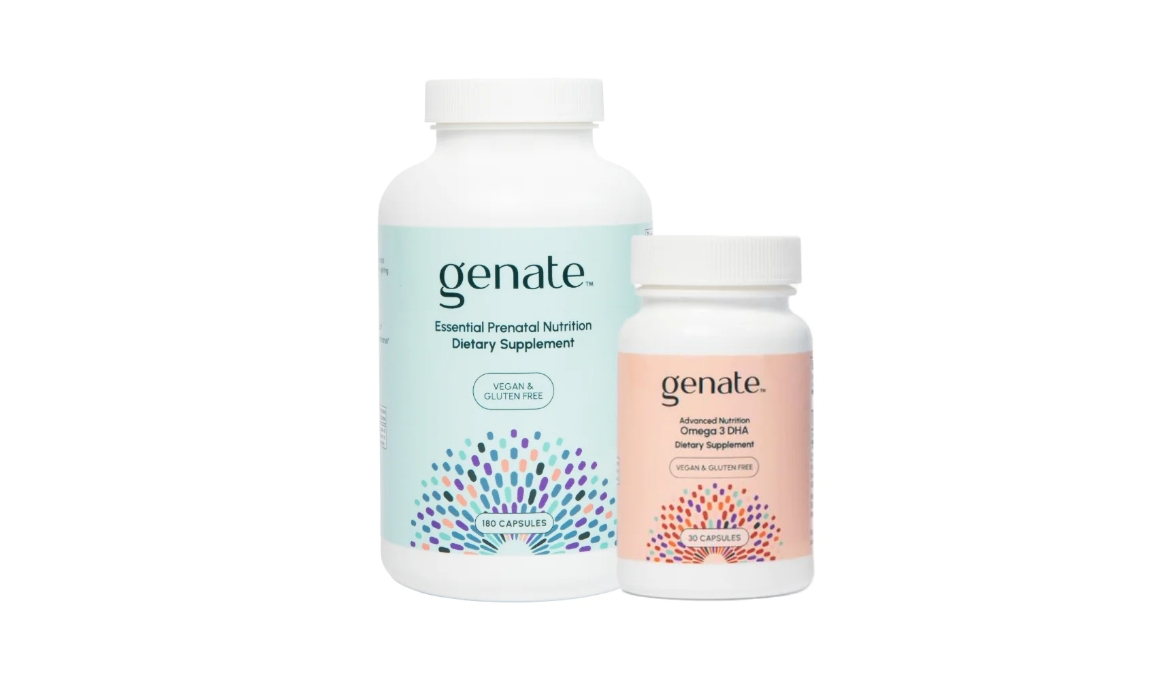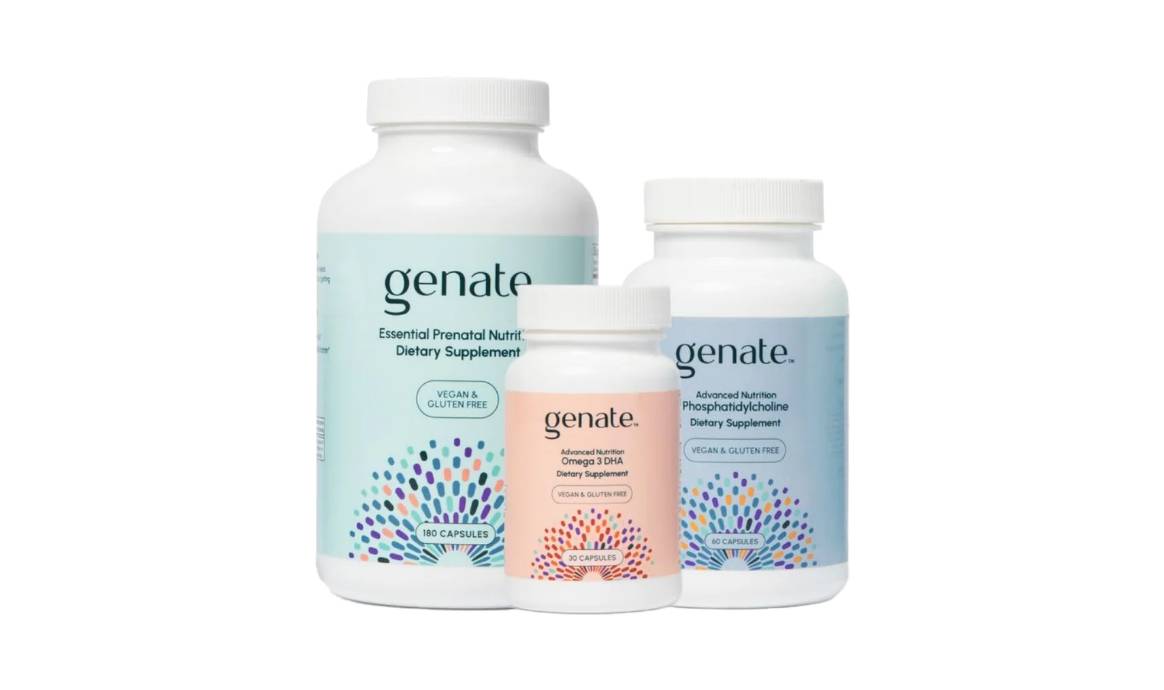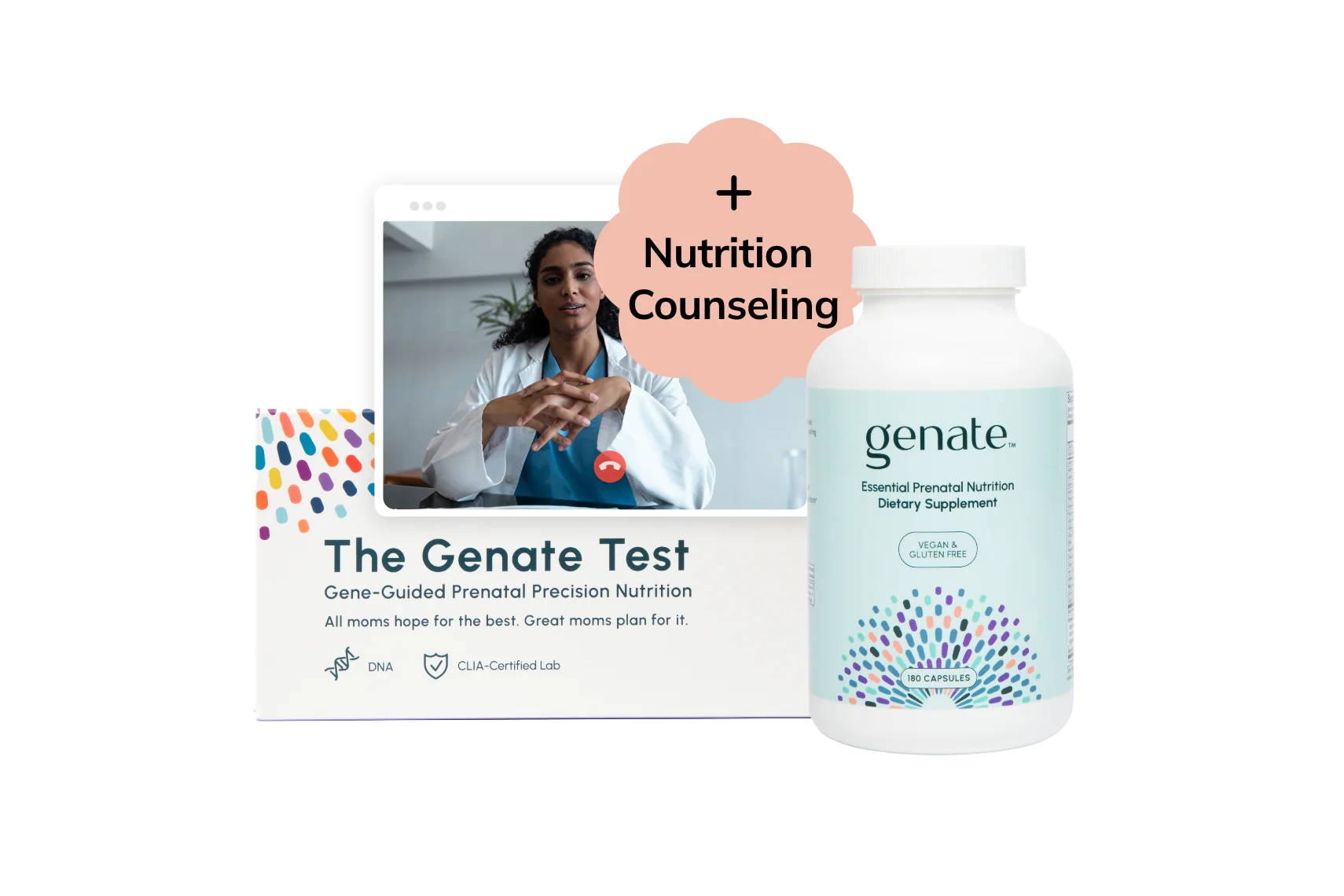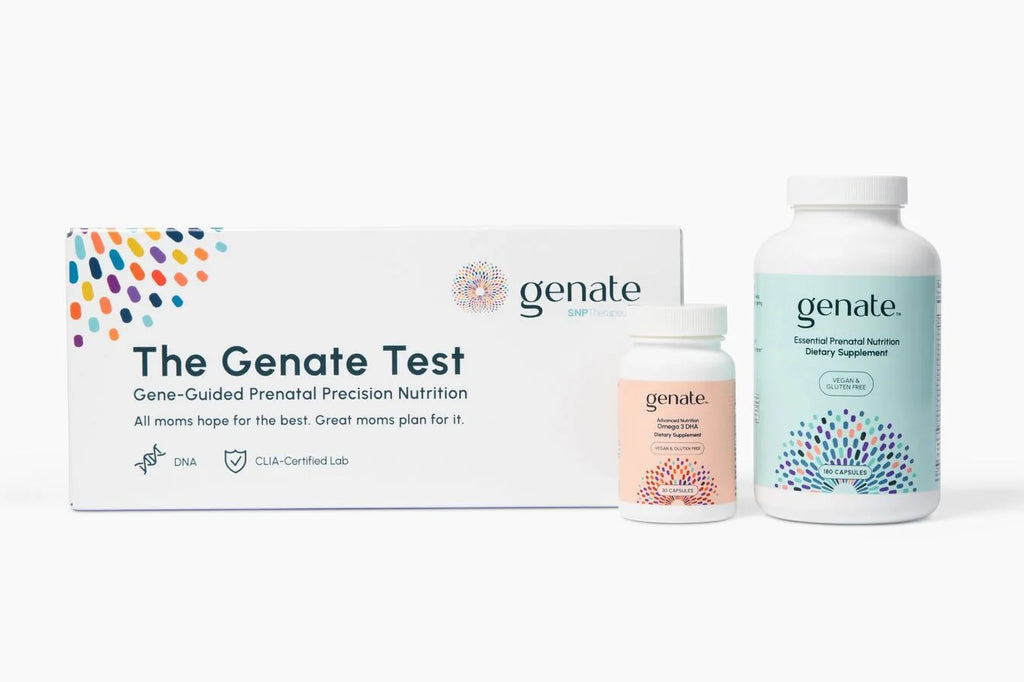Good nutrition is essential for every stage of your baby’s growth and development. But the efficiency with which your body metabolizes nutrients is partly determined by your genes, and common genetic variants can affect the metabolism of one-carbon nutrients that are critical for the development of your child’s brain and spinal cord. Genate Essential Prenatal Nutrition is a multivitamin formulated from academic research that provides women with a formulation optimized to support their baby’s cognitive development. It includes the one-carbon nutrients choline, betaine, methylfolate, and B vitamins that many women have trouble metabolizing and/or don’t get enough of in their diet.

DIET & NUTRITION
What to Eat in the First Trimester — A Food & Nutrient Guide for Pregnancy
by Alyssa Clement, MS, RD, LDN • Medically Reviewed by Cara Everett, MS, RDN, LDN
October 23, 2023 • Updated: April 5, 2024 • 5-7 minute read
Pregnancy places increased demands on your body as it works to support both you and your growing baby. Eating correctly throughout pregnancy is vital to ensure you’re providing the nutrients needed for your baby’s growth and development, and your first trimester is the perfect time to get started on a healthy pregnancy diet.
Get the Genate Test to find out if you have genetic roadblocks that could impact how your body processes nutrients, and discuss the best pregnancy diet with your healthcare provider or nutritionist.
First Trimester Nutrition: Essential Nutrients
Wondering what to eat in the first trimester of pregnancy? Take a look at our list of the best first trimester foods, and read on for ways to ensure you’re getting the calories and nutrition you need as you begin your pregnancy. A prenatal multivitamin like the Genate Essential Prenatal Vitamin is a great foundation to support you and your baby, containing 20 key nutrients to encourage healthy growth.
Discover the genetics that affect your baby's cognitive development
Calorie Needs
Calorie needs don’t change much in the beginning of a healthy pregnancy; most women in the first trimester need the same number of calories as non-pregnant women. The Dietary Guidelines for Americans advise the following calorie intake during pregnancy:
- 2,000 kcal/day for women ages 19–30
- 1,800 kcal/day for women ages 31–50
Choline
Choline is one of the most important nutrients for a healthy pregnancy because without it, your baby’s brain, spinal cord, and nervous system can’t develop properly.
Choline is known as a one-carbon nutrient. Other one-carbon nutrients that play key roles in fetal development include betaine, methionine, folate, and other B vitamins. One carbon-nutrients are critical for the formation of your baby’s DNA, nerve cells, and cell membranes.
How Much Choline Do You Need?
The Dietary Guidelines advise pregnant women to consume 450 milligrams per day of choline. Choline is found in meat, eggs, beans, peas, lentils, and some prenatal supplements.
Top Food Sources of Choline
The Dietary Guidelines advise pregnant women to consume 450 milligrams per day of choline. Choline is found in meat, eggs, beans, peas, lentils, and some prenatal supplements.
Food
Beef liver
Egg
Beef steak
Soybeans
Chicken breast
Ground beef
Serving Size
3 ounces
1 large
3 ounces
½ cup
3 ounces
3 ounces
Choline (mg)
356
147
117
107
72
72
Folate
How Much Folate Do You Need?
The recommended daily intake (RDI) of folate during pregnancy is 600 micrograms. You can find this nutrient in dark leafy green vegetables, fruit, fruit juice, nuts, beans, seafood, eggs, dairy, meat, and poultry.
Top Food Sources of Folate
Food
Beef liver
Spinach, boiled
Black-eyed peas, boiled
Breakfast cereals fortified with 25% daily value of folate
Rice, cooked
Asparagus
Brussels sprouts
Serving Size
3 ounces
½ cup
½ cup
Variable
½ cup
4 spears
½ cup
Folate (mg)
215
131
105
100
90
89
78
The Centers for Disease Control and Prevention recommends that women planning to become pregnant consume at least 400 mcg of folic acid per day, through either food or supplements, for the following reasons:
- You need to build your body’s stores of folate before your baby starts growing.
- The neural tube completes its development around the sixth week of conception, at a stage when many women don’t even know they’re pregnant.
Iron
Your blood volume increases during pregnancy, requiring more dietary iron to support greater production of red blood cells.
How Much Iron Do You Need?
The recommended daily intake of iron during pregnancy is 27 milligrams. Iron is found in meat, seafood, beans, lentils, whole grains, vegetables and fortified breakfast cereals and breads.
Top Food Sources of Iron
Food
Breakfast cereals fortified with 25% daily value of iron
Oysters, cooked
White beans, canned
Beef liver
Lentils, cooked
Spinach, cooked
Tofu
Serving Size
Variable
3 ounces
3 ounces
3 ounces
½ cup
½ cup
½ cup
Iron (mg)
18
8
8
5
3
3
3
Iodine
Iodine supports healthy thyroid function. In the first trimester, your baby’s thyroid isn’t fully developed, and your thyroid also supports your baby. Iodine also helps your baby’s brain, central nervous system, and bones develop properly.
How Much Iodine Do You Need?
Throughout pregnancy, you need to consume 290 micrograms of iodine each day. Iodine is fairly widespread in foods; you can find significant amounts in iodized table salt, dairy, eggs, and seafood.
Top Food Sources of Iron
Food
Cod
Dried seaweed (nori)
Oysters, cooked
Greek yogurt
Milk
Iodized salt
Serving Size
3 ounces
2 Tbs
3 ounces
½ cup
1 cup
¼ tsp
Iron (mg)
158
116
93
87
85
76
DHA
Docosahexaenoic acid (DHA) is an omega-3 fatty acid, and it plays key roles in your baby's brain and eye development.
How Much DHA Do You Need?
Aim for about 200 milligrams of DHA per day from either food or supplements.
Omega-3 fatty acids are found in seafood, flaxseed, chia seeds, and fortified dairy and eggs. When eating seafood while pregnant, avoid high mercury fish such as king mackerel, shark and swordfish. DHA supplements are a safe way to make sure you’re getting enough of this essential fatty acid without the possibility of high mercury levels.
Top Food Sources of DHA
Food
Atlantic salmon
Herring
Sardines
Mackerel
Sea bass
Serving Size
3 ounces
3 ounces
3 ounces
3 ounces
3 ounces
Iron (mg)
124
94
74
59
47
The Bottom Line About Nutrition in the First Trimester
Proper nutrition during pregnancy is vital for your baby’s development and your health. It’s important to know what to eat in the first trimester, as it’s a short but critical window of time to make sure you and your little one are off to a great start with the right nutrients in the proper amounts.
Get the Genate Test to determine if you have metabolic roadblocks that impact how your body processes the nutrients your baby needs, and to discuss the best pregnancy diet with your healthcare provider or nutritionist.
This article is not intended as medical advice to treat or diagnose any health condition but rather as educational health information for the general public. It should not be used as a substitute for individualized medical care from your healthcare provider.
Shop the Article
Save 23% today!
Genate Essential Prenatal Multivitamin + Advanced Omega-3 DHA Package
Bundle to increase savings and provide the foundational nutrients needed for optimal health and development.
From $72 per month
Save 23% today!
Comprehensive Prenatal Support Package
Genate Essential Prenatal Multivitamin + Advanced Omega-3 DHA + Phosphatidylcholine
Our most comprehensive bundle - you’ll receive our Essential Prenatal Multivitamin, Advanced Phosphatidylcholine, and Advanced Omega-3 DHA.
From $110 per month
Save 30% today!
Comprehensive Prenatal Nutrition Bundle
Buy the Genate Test and a nutrition counseling session with a Genate registered dietitian, and receive a 30-day supply of the Genate Essential Prenatal Multivitamin FREE. Purchase includes a 90-day prenatal multivitamin subscription at our best monthly price.
$309
References
- U.S. Department of Agriculture and U.S Department of Health and Human Services (2020). Dietary Guidelines for Americans, 2020-2025. 9th Edition. https://www.dietaryguidelines.gov/sites/default/files/2021-03/Dietary_Guidelines_for_Americans-2020-2025.pdf
- Mayo Clinic. Prenatal Supplements: Why They Matter, How to Choose. (2022, April 19). https://www.mayoclinic.org/healthy-lifestyle/pregnancy-week-by-week/in-depth/prenatal-vitamins/art-20046945
- National Academies of Sciences, Engineering, and Medicine. Nutrition During Pregnancy and Lactation: Exploring New Evidence: Proceedings of a Workshop. Washington (DC): National Academies Press. (2020, Jul 31). https://www.ncbi.nlm.nih.gov/books/NBK562637/
- Mayo Clinic. Pregnancy Week by Week. (2022, June 3). https://www.mayoclinic.org/healthy-lifestyle/pregnancy-week-by-week/in-depth/prenatal-care/art-20045302
- Centers for Disease Control and Prevention. (2022, June 17). Key Findings: Folic Acid Fortification Continues to Prevent Neural Tube Defect. https://www.cdc.gov/ncbddd/folicacid/features/folicacid-prevents-ntds.html
- National Institutes of Health, Office of Dietary Supplements (2021). Folate. https://ods.od.nih.gov/factsheets/Folate-HealthProfessional/
- Mayo Clinic. Folate (Folic Acid). (2021, February 23). https://www.mayoclinic.org/drugs-supplements-folate/art-20364625
- National Institutes of Health, Office of Dietary Supplements (2022). Iodine. https://ods.od.nih.gov/factsheets/Iodine-HealthProfessional/
- National Institutes of Health, Office of Dietary Supplements (2022). Omega-3 Fatty Acids. https://ods.od.nih.gov/factsheets/Omega3FattyAcids-HealthProfessional/
- Coletta, Jaclyn M., Bell, Stacey J, and Roman, Ashley S. Omega-3 Fatty Acids and Pregnancy. (2010). Reviews in Obstetrics and Gynecology, 3: 4. https://www.ncbi.nlm.nih.gov/pmc/articles/PMC3046737/
- Federal Drug Administration (2021). Advice about Eating Fish. https://www.fda.gov/food/consumers/advice-about-eating-fish
Take the Genate Quiz
Take our Nutrition Quiz to learn more about your nutrition journey.
Read Our Latest Articles
Frequently Asked Questions
What are the benefits of my baby getting the proper nutrients?
What are one-carbon nutrients and fatty acids, and why are they important?
One-carbon nutrients and fatty acids are critical for brain and spinal cord development during pregnancy and through the first two years of life. Although all nutrients are important, the one-carbon nutrients choline, folate, betaine, and B vitamins, along with the omega-3 fat DHA, provide the building blocks for proper growth of your developing baby's brain. Research at Cornell and Harvard universities has shown cognitive benefits for children born to mothers who received increased levels of one-carbon nutrients during pregnancy, demonstrating that optimal nutrition during pregnancy can have lasting effects for your baby.
If I buy Genate nutrition supplements, do I still need to take the test?
Genetic testing is a personal choice, and only you can decide what’s best for you and your baby. But the Genate Test is a powerful tool for optimizing your nutrition status, as it identifies genetically-caused metabolic inefficiencies that may influence your body’ ability to make and use the nutrients critical for your baby’s cognitive development. If you have SNPs in any of the nutrient pathways tested, your Genate Report will provide personalized recommendations for optimizing your nutrition. Our registered dietitians can show you how to fill in the gaps with foods and supplementation, if needed, to make sure you’re getting the nutrition you and your baby need.








